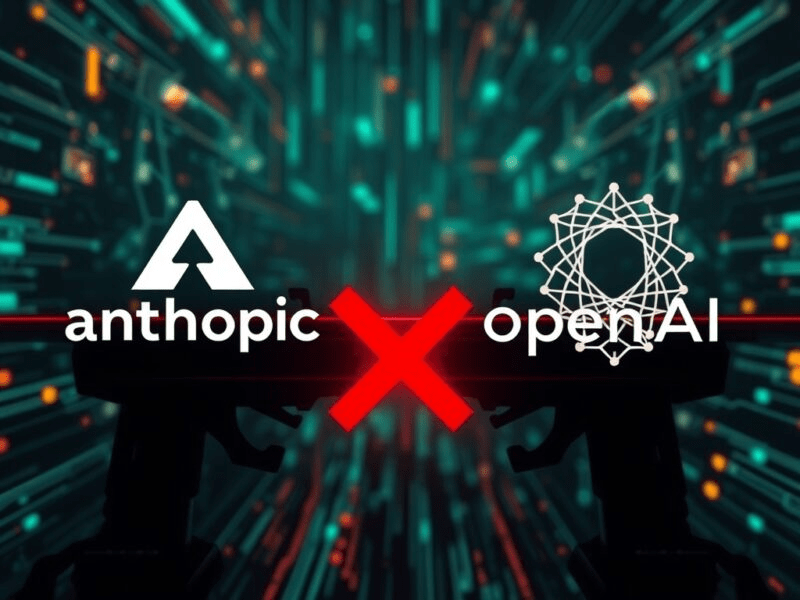from the materials of the site - By ItsBitcoinWorld

In the fast-changing world of artificial intelligence, where innovation and competition often go hand in hand, a significant event has resonated throughout the industry. Leading AI company Anthropic has reportedly taken a decisive step by revoking its competitor OpenAI's access to its cutting-edge Claude AI models. This move, prompted by alleged violations of Anthropic's terms of service, underscores the intensifying competition in the AI sector and raises important questions about data usage, proprietary technologies, and the future development of foundational AI models such as GPT-5.
As reported by Wired, the crux of this escalating dispute revolves around how OpenAI allegedly utilized Anthropic's Claude AI models. Sources indicate that OpenAI integrated Claude into its internal tools. This integration reportedly allowed OpenAI to compare Claude's performance with its own models across various critically important categories, including coding, writing, and security protocols. For Anthropic, this was a direct violation of commercial terms that explicitly prohibit companies from using Claude to develop competing services.
A representative from Anthropic outlined their position, stating: "OpenAI's technical staff also used our programming tools before the launch of GPT-5." This detail points to a strategic move by OpenAI aimed at gathering information about a competitor’s capabilities, which could potentially assist in the development of a next-generation model. Such competitive intelligence gathering, while common in many industries, crosses boundaries by violating contractual agreements designed to protect intellectual property and ensure market advantages.
In response to Anthropic's decision, a representative from OpenAI expressed disappointment, noting: "We respect Anthropic's decision to close our access to the API, but it is disappointing considering our API remains accessible to them." This statement highlights the complex dynamics of the AI ecosystem, where companies are simultaneously competitors and, at times, reluctantly collaborate through API access. OpenAI's position suggests a desire for ongoing mutual access, possibly for its own benchmarking or research purposes, even while developing its own powerful models.
This incident is not an isolated one in the history of AI competition. It echoes previous instances where Anthropic has shown reluctance to grant access to competitors. Chief Scientist Jared Kaplan previously justified the cessation of support for Windsurf (rumored to have been targeted for acquisition by OpenAI, later acquired by Cognition), stating: "I think it would be strange if we sold Claude to OpenAI." This consistent stance underscores Anthropic's commitment to protecting its technological advantage and preventing direct use of its models by competitors.
The crux of the matter lies in the delicate balance between open innovation and the protection of proprietary rights. While many AI development companies offer API access to stimulate development and expand their presence, they also set strict terms of service to prevent abuse, particularly from direct competitors. Anthropic's terms are crystal clear: using Claude AI to create competing services is prohibited. Alleged actions by OpenAI, especially in the context of the upcoming launch of GPT-5, seemingly violate these terms.
This situation reveals several important aspects:
Proprietary technology versus open access: The contradiction between providing access to powerful AI models through APIs and protecting key intellectual property from use by competitors.
Ethics of benchmarking: The ethical boundaries of using a competitor’s product for internal benchmarking, especially if it could aid in developing a competing product.
The race for next-generation models: The pressing need for leading AI labs to develop and launch more advanced models, such as GPT-5, drives fierce competition. This incident serves as a stark reminder that as AI capabilities evolve, so too will the business relationships, legal frameworks, and ethical considerations in the industry.
Anthropic's decision to revoke OpenAI's access to Claude AI models marks a turning point in the ongoing competition in AI. It underscores the fierce competition driving innovation in the sector and what companies are willing to do to protect their competitive advantages. As the race to develop increasingly sophisticated models, such as GPT-5, accelerates, one can expect an increase in similar strategic maneuvers and legal skirmishes. This incident serves as a compelling reminder that the future of AI involves not only technological breakthroughs but also a complex interplay of business strategy, intellectual property, and ethical behavior. The AI field is evolving, and with this maturity comes a deeper understanding of the commercial realities and boundaries of competition.